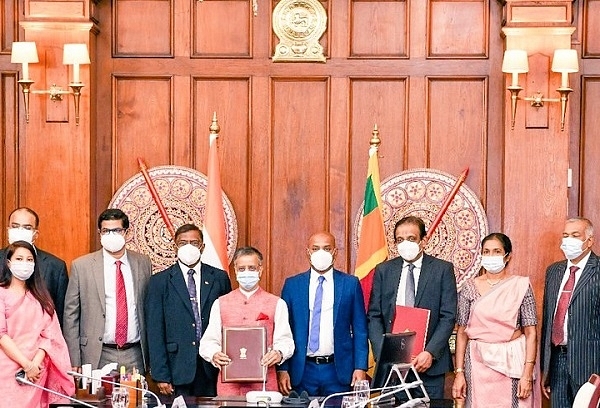Insta
India Provides $100 Million Line Of Credit To Sri Lankan Govt For Solar Energy Projects

Officials of India and Sri Lanka (High Commission of India in Colombo)
Sri Lanka’s renewable energy sector received a significant boost as India has extended a $100 million worth Line of Credit (LOC) to the island nation to finance its several solar energy-related projects.
These initiatives are set to ensure that about 70 per cent of Sri Lanka’s power requirements are taken care of through renewable energy sources by 2030.
Gopal Baglay, India’s High Commissioner to Sri Lanka and Secretary to the Treasury S R Attygalle, exchanged an agreement having signatures of the Export-Import Bank of India and the Sri Lankan government in the presence of the neighbouring country’s President Gotabaya Rajapaksa on Wednesday.
Projects such as rooftop solar photovoltaic systems for households and government buildings that were announced during the Founding Conference of the International Solar Alliance (ISA) conducted in March 2018 will be funded through this 100 million LOC.
“The shared vision of our countries in the renewable energy sector reflects our common national priorities and convergence of approaches for sustainable development,” the High Commission’s official statement read, as per a report by The Economic Times.
It added, “Strengthening collaboration in this vital sector will help enhance our overall energy partnership and contribute towards our global efforts to tackle climate change and reduce emissions.”
The Sri Lankan government is also taking steps to boost the contribution of renewable energy sources to the national power grid.
It is considering availing the contributions of state-owned buildings, houses of low-income families, and worship places to generate solar power. The government will also store solar energies in batteries for families who cannot access the national power grid due to relatively poor incomes.
Support Swarajya's 50 Ground Reports Project & Sponsor A Story
Every general election Swarajya does a 50 ground reports project.
Aimed only at serious readers and those who appreciate the nuances of political undercurrents, the project provides a sense of India's electoral landscape. As you know, these reports are produced after considerable investment of travel, time and effort on the ground.
This time too we've kicked off the project in style and have covered over 30 constituencies already. If you're someone who appreciates such work and have enjoyed our coverage please consider sponsoring a ground report for just Rs 2999 to Rs 19,999 - it goes a long way in helping us produce more quality reportage.
You can also back this project by becoming a subscriber for as little as Rs 999 - so do click on this links and choose a plan that suits you and back us.
Click below to contribute.
Latest